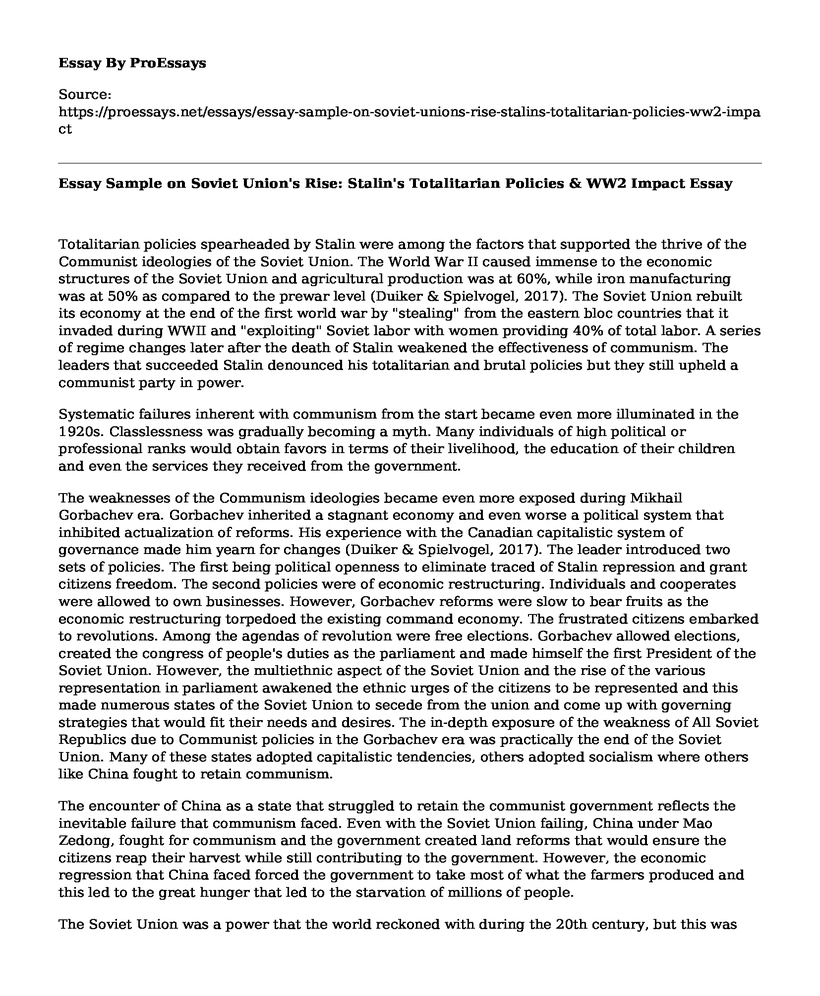Totalitarian policies spearheaded by Stalin were among the factors that supported the thrive of the Communist ideologies of the Soviet Union. The World War II caused immense to the economic structures of the Soviet Union and agricultural production was at 60%, while iron manufacturing was at 50% as compared to the prewar level (Duiker & Spielvogel, 2017). The Soviet Union rebuilt its economy at the end of the first world war by "stealing" from the eastern bloc countries that it invaded during WWII and "exploiting" Soviet labor with women providing 40% of total labor. A series of regime changes later after the death of Stalin weakened the effectiveness of communism. The leaders that succeeded Stalin denounced his totalitarian and brutal policies but they still upheld a communist party in power.
Systematic failures inherent with communism from the start became even more illuminated in the 1920s. Classlessness was gradually becoming a myth. Many individuals of high political or professional ranks would obtain favors in terms of their livelihood, the education of their children and even the services they received from the government.
The weaknesses of the Communism ideologies became even more exposed during Mikhail Gorbachev era. Gorbachev inherited a stagnant economy and even worse a political system that inhibited actualization of reforms. His experience with the Canadian capitalistic system of governance made him yearn for changes (Duiker & Spielvogel, 2017). The leader introduced two sets of policies. The first being political openness to eliminate traced of Stalin repression and grant citizens freedom. The second policies were of economic restructuring. Individuals and cooperates were allowed to own businesses. However, Gorbachev reforms were slow to bear fruits as the economic restructuring torpedoed the existing command economy. The frustrated citizens embarked to revolutions. Among the agendas of revolution were free elections. Gorbachev allowed elections, created the congress of people's duties as the parliament and made himself the first President of the Soviet Union. However, the multiethnic aspect of the Soviet Union and the rise of the various representation in parliament awakened the ethnic urges of the citizens to be represented and this made numerous states of the Soviet Union to secede from the union and come up with governing strategies that would fit their needs and desires. The in-depth exposure of the weakness of All Soviet Republics due to Communist policies in the Gorbachev era was practically the end of the Soviet Union. Many of these states adopted capitalistic tendencies, others adopted socialism where others like China fought to retain communism.
The encounter of China as a state that struggled to retain the communist government reflects the inevitable failure that communism faced. Even with the Soviet Union failing, China under Mao Zedong, fought for communism and the government created land reforms that would ensure the citizens reap their harvest while still contributing to the government. However, the economic regression that China faced forced the government to take most of what the farmers produced and this led to the great hunger that led to the starvation of millions of people.
The Soviet Union was a power that the world reckoned with during the 20th century, but this was only a short-lived glory. Communism actualized in the Soviet Union differed significantly with Mark's theoretical communism. Totalitarian politics denied individual members of their needs, more so with the secretary-general of the communist party residing in Moscow. A combination of weakness that was inherent from the start and others that became apparent during the world war, the end of Stalinism and Gorbachev era with his implementation of hands-off approach caused the fall of the union and the birth of socialism.
Reference
Duiker, W. J., & Spielvogel, J. J. (2017). The Essential World History, Volume II 8th Edition: 2017, Cengage Learning.
Cite this page
Essay Sample on Soviet Union's Rise: Stalin's Totalitarian Policies & WW2 Impact. (2023, Feb 27). Retrieved from https://proessays.net/essays/essay-sample-on-soviet-unions-rise-stalins-totalitarian-policies-ww2-impact
If you are the original author of this essay and no longer wish to have it published on the ProEssays website, please click below to request its removal:
- Film Capitalism: A Love Story Essay
- The Revolt of the Gladiator Spartacus Paper Example
- Abraham Lincoln's Assassination Paper Example
- Literary Analysis Essay on Epistle 1.8 and Epistle 1.19
- Sinaloa Cartel: International Drug Trafficking Group Making Youth Their Target - Essay Sample
- Essay on Mexico-American War: Cultural Adaptation, Political Discrimination, and Identity Formation
- Research Paper Example: Inclusive Development in South Africa







